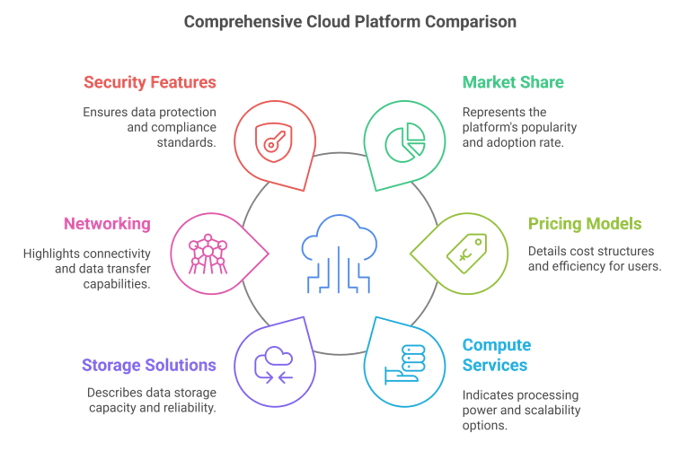- April 1, 2025
Did you know that AWS, Microsoft Azure, and Google Cloud Platform together control more than 60% of the cloud market worldwide? Amazing, right? With that kind of power, picking the right cloud platform can feel like trying to find your way through a maze.
Each of these big players brings something different to the table, so it’s super important to really get a handle on what sets them apart.
Whether you’re a business trying to grow, a developer on the hunt for some solid tools, or a large enterprise looking for smooth integration, this guide is here to help you figure out your best fit.
We’re diving into the top 10 differences between Azure, AWS, and GCP. So, let’s explore what each of these platforms has to offer and see which one might be your ticket to success!
Why wait? Let’s start exploring!!
Why Compare Azure, AWS, and GCP?
Alright, when we talk about the big players in the cloud market such as AWS, Azure, and GCP, it’s important for businesses to get a grip on what sets them apart. That way, they can figure out which platform is actually the right fit for their needs.
Now, each of these platforms has its own unique strengths. Like, AWS is all about offering a ton of services and having a wide global presence. Azure, on the other hand, really shines when it comes to integrating smoothly with Microsoft products. And then there’s GCP, which is pretty much the go-to for big data and machine learning.
When it comes to cloud pricing comparison, it can swing wildly from one provider to the next. So, if organizations take the time to compare these costs, they can find the most budget-friendly option that fits what they need. Smart move, right?
And then there comes the range of services. Each platform, AWS, Azure, and GCP, offers a wide variety, but the specifics really do differ. This means businesses must analyze what services they actually need to make the right choice.
Now, performance and reliability! This is crucial. Different providers have their own levels of performance and uptime. By comparing them, companies can ensure they pick a platform that can really deliver when it counts.
Let’s not forget about compliance and security. Each of these cloud service providers has its own set of certifications and security features. If businesses take a moment to compare these aspects, they can make sure they’re meeting regulations and keeping their data safe.
Innovation is another factor. The speed at which these companies innovate can vary quite a bit. By looking at this, businesses can choose a platform that’s going to keep up with their growth and all the tech advancements coming down the pipeline.
Lastly, support and the ecosystem around each platform matter too. AWS, Azure, and GCP? They all have distinct levels of community support, third-party integrations, and their own networks of partners. This can totally sway a business’s decision, depending on what kind of support they’re looking for.
So, yes, there’s a lot to think about when it comes to choosing the right cloud provider!
10 critical factors for comparing cloud platforms – AWS, Azure & GCP

1. Market Share and Popularity
When we look at the cloud market, it’s clear that AWS, Azure, and GCP are the big players. AWS is, like, the top cloud service provider, holding the largest part of the market. This level of adoption really shows that people trust these services.
AWS got in there early, which has given it quite an advantage. On the other hand, Azure plays nicely with Microsoft products, and that’s a big draw for businesses that are already in the Microsoft ecosystem.
GCP, which, sure, is smaller, but it’s really making a name for itself with innovative features especially when it comes to data analytics and machine learning.
2. Pricing Models and Cost Efficiency
If businesses dive into a cloud pricing comparison, they’ll find that each cloud managed service provider has its own way of doing things. AWS has this pay-as-you-go option, additionally there are ways to save with reserved instances and savings plans.
Azure is kind of in the same boat, offering similar models but with some extra perks for folks who already use Microsoft services.
GCP really shines here with its sustained use discounts basically, the more you use it, the better the savings without you having to lift a finger.
3. Compute Services and Scalability
Getting to the compute services, AWS takes the cake with the widest variety of instance types. This means they can handle just about any workload you throw at them.
Azure’s compute services are super well-integrated with their other tools, which is great for companies that are deep into using Microsoft solutions.
GCP, meanwhile, is known for its robust performance and flexibility, especially when it comes to managing large-scale data processing tasks. It’s impressive!
4. Storage Solutions
It’s clear that AWS S3 is the go-to choice for object storage. It’s known for being super durable and scalable, which is a big plus.
Then there’s Azure Blob Storage, great at managing unstructured data, and it plays nicely with other Azure services, which is a win.
GCP’s Cloud Storage, on the other hand, is budget-friendly and integrates well with those big data and machine learning tools they have.
5. Networking Capabilities
Now, if we switch gears to cloud networking, AWS comes through with a solid range of networking tools.
Talking about VPCs, Direct Connect, and Route 53 comprehensive systems, Azure doesn’t lag behind either, it has a strong networking setup with features like ExpressRoute and Virtual WAN, perfect for those hybrid cloud situations.
GCP, well, it’s all about keeping things simple and secure in the networking space, with tools like VPC, Cloud Interconnect, and Cloud DNS making life easier.
6. Security and Compliance Features
Looking at security, you’ll find that all three providers AWS, Azure, and GCP bring some serious cloud security solutions to the table. They all offer Identity and Access Management (IAM), encryption, and they comply with key standards like GDPR, HIPAA, and SOC.
Each of these cloud platforms has its own unique security tools and best practices, which helps in making sure your data stays safe and meets regulatory requirements.
7. Machine Learning (ML) and AI Services
So, when you think about powerful tools for machine learning and AI, you can’t overlook AWS, Azure, and GCP. Each of them has something unique to offer.
For instance, AWS SageMaker? It’s pretty much a one-stop-shop for everything related to building, training, and deploying machine learning models. Super comprehensive.
Then there’s Azure Machine Learning, which plays nicely with another Azure cloud service and has a straightforward interface that anyone can pick up.
And how about GCP’s Vertex AI? It really shines when it comes to AI research and works seamlessly with TensorFlow, making it a favorite among data scientists.
8. Hybrid Cloud Solutions
Azure’s kind of taken the lead here with its Azure Arc and Azure Stack tools. They really make it easy to manage both on-premises and cloud resources without a hitch.
AWS isn’t sitting back, though, they’ve got Outposts, which allows to extend AWS infrastructure right into your own environments.
And then GCP’s Anthos is designed for managing applications across different clouds and on-prem servers, providing flexibility and consistency that’s very much essential.
9. Global Reach and Data Center Availability
Coming to global reach and availability of data centers, AWS is the heavyweight champion. They boast 99 Availability Zones spread across 31 different geographic regions.
That’s quite a footprint! Azure’s not too far behind with over 60 regions around the globe, so they’ve got a decent reach as well.
And GCP? They’re operating in 24 regions with 73 zones, focusing on strategic spots to really boost performance and reliability. So, yes, it’s all about finding the right fit for your needs!
10. Developer Tools and Ecosystem Integration
For cloud integration solutions, AWS really has a lot to offer. They’ve got a whole bunch of developer tools like AWS Lambda and CloudFormation and don’t forget about that extensive marketplace with tons of third-party integrations.
Now, Azure? Well, it really shines when it comes to hooking up with Microsoft services. Think Office 365 and Dynamics 365. It creates this smooth, seamless ecosystem that many businesses find super handy.
On the other hand, GCP is all about supporting containerization and Kubernetes. With tools like Google Kubernetes Engine and Cloud Build, it’s no wonder that developers really seem to favor it.
By taking a good look at these aspects, companies can figure out which cloud platform suits them best. It’s about making smart choices to ensure they pick the right one that aligns with their needs and goals.
Use Cases and Recommendations
Use Case –1: Organizations looking for budget-friendly cloud solutions.
Recommendation: It’s advisable to perform a cloud pricing analysis to find the most economical choice. AWS offers flexible pricing options, Azure is advantageous for Microsoft users, and GCP’s sustained use discounts can lead to significant savings.
Use Case – 2: Companies that need scalable computing resources.
Recommendation: In a comparison of cloud compute services, AWS has the widest variety of instance types, Azure integrates seamlessly with Microsoft environments, and GCP stands out in high-performance computing.
Use Case – 3: Businesses that require dependable and scalable storage.
Recommendation: For cloud storage evaluation, AWS S3 is considered the industry benchmark, Azure Blob Storage is ideal for unstructured data, and GCP Cloud Storage presents cost-effective and scalable alternatives.
Use Case – 4: Enterprises that need a strong networking infrastructure.
Recommendation: When assessing cloud networking services, AWS offers a comprehensive suite of networking tools, Azure is known for its robust hybrid capabilities, and GCP is recognized for its user-friendly approach and security.
Use Case – 5: Organizations that prioritize strong security and compliance.
Recommendation: A comparison of cloud security reveals that all three providers have solid security protocols. AWS, Azure, and GCP each boast extensive compliance certifications and security features.
Pros and Cons Table of AWS, Azure & GCP:
| Feature | AWS | Azure | Google Cloud Platform (GCP) |
|
Pros |
|
|
|
|
Market Leadership |
Longest-standing cloud provider with a mature ecosystem. |
Strong integration with Microsoft tools (e.g., Office 365, Active Directory). |
Innovative services and leadership in AI, ML, and Big Data. |
|
Service Portfolio |
Wide range of services across compute, storage, and networking. |
Broad hybrid cloud capabilities and enterprise-grade services. |
Simple and user-friendly interface with strong data analytics tools. |
|
Global Reach |
Largest global infrastructure footprint across data centers. |
Extensive global network with robust regional coverage. |
Growing global presence with focus on edge computing solutions. |
|
Scalability |
Highly scalable with robust architecture for handling large workloads. |
Well-suited for enterprise scalability and hybrid environments. |
Great for startups and research due to cost-effective solutions. |
|
Pricing Options |
Flexible pricing with extensive cost management tools. |
Competitive pricing, especially for Microsoft license holders. |
Discounts for sustained usage and cost-efficiency for AI/ML workloads. |
|
Specialized Services |
Advanced solutions for IoT, analytics, and cloud-native applications. |
Strong enterprise-grade tools for SAP, Windows, and .NET environments. |
Excellent machine learning and data analytics capabilities. |
| Cons | |||
|
Pricing Complexity |
Pricing can be confusing due to the number of options and tiers. |
Slightly higher costs for non-Microsoft customers. |
Limited third-party integrations compared to AWS and Azure. |
|
Learning Curve |
Steep learning curve for beginners due to the complexity of services. |
Can be overwhelming for non-Microsoft ecosystems. |
Smaller service catalog compared to AWS and Azure. |
|
Regional Availability |
Strong, but latency issues can occur in less-covered regions. |
Fewer services in non-Microsoft native regions compared to AWS. |
Fewer data centers compared to AWS and Azure, impacting availability. |
|
Market Share |
Dominant, but competition is catching up in AI/ML. |
Sometimes lags in launching innovative services compared to AWS/GCP. |
Still growing its market share and global presence. |
|
Customizability |
Highly customizable but may require advanced expertise. |
Less customizable compared to AWS in certain areas. |
Limited enterprise-grade services compared to AWS and Azure. |
Conclusion
Choosing the right cloud platform really calls for a solid grasp of what each one brings to the table. It’s not just about what looks good on paper. You’ve got to dive into some key aspects like how far they reach globally, their machine learning features, any hybrid cloud options they offer, the tools for developers, and how broad their services are. When businesses take the time to assess these points, they can make smarter choices that really fit their specific needs and goals.
In the end, what’s the best cloud platform? Well, it all hinges on your organization’s unique needs, budget, and those long-term plans you have. If you take a moment to really think about these things, you’ll be in a better position to select a platform that’s going to back you up on your digital transformation journey and help you hit those business targets. It’s all about finding that right match!
Happy Learning!!
Dive deeper into the unique strengths of AWS, Azure, and GCP to find the perfect fit.
Take the Next Step in Your Cloud Journey
FAQs
What are Azure, AWS, and GCP?
Azure, AWS, and GCP are the top cloud computing platforms offering a range of services, including storage, computing, networking, and cutting-edge technologies like AI and machine learning. These platforms help businesses scale, innovate, and enhance their IT infrastructure.
Why are Azure, AWS, and GCP considered the top cloud providers?
They are recognized for their wide range of services, global reach, and strong security protocols, providing dependable solutions for businesses of all sizes. Their dedication to innovation and capacity to serve different industries reinforce their leadership roles.
What factors should I consider when choosing a cloud platform?
Take into account aspects such as the services offered, pricing models, availability in your region, compatibility with current systems, and how well they support your unique business needs. It’s also crucial to assess long-term scalability, security measures, and compliance obligations.
Which cloud platform is the most cost-effective?
The cost-effectiveness varies based on your specific use case, but GCP typically offers competitive pricing for AI and ML workloads, especially with sustained usage. AWS and Azure also provide flexible pricing models, with Azure often being more cost-effective for environments that rely on Microsoft technologies.
How do Azure, AWS, and GCP compare in terms of global reach and data center availability?
AWS boasts the largest global infrastructure and availability zones, with Azure not far behind, providing robust regional coverage. GCP is growing quickly but still has a smaller presence compared to AWS and Azure.




